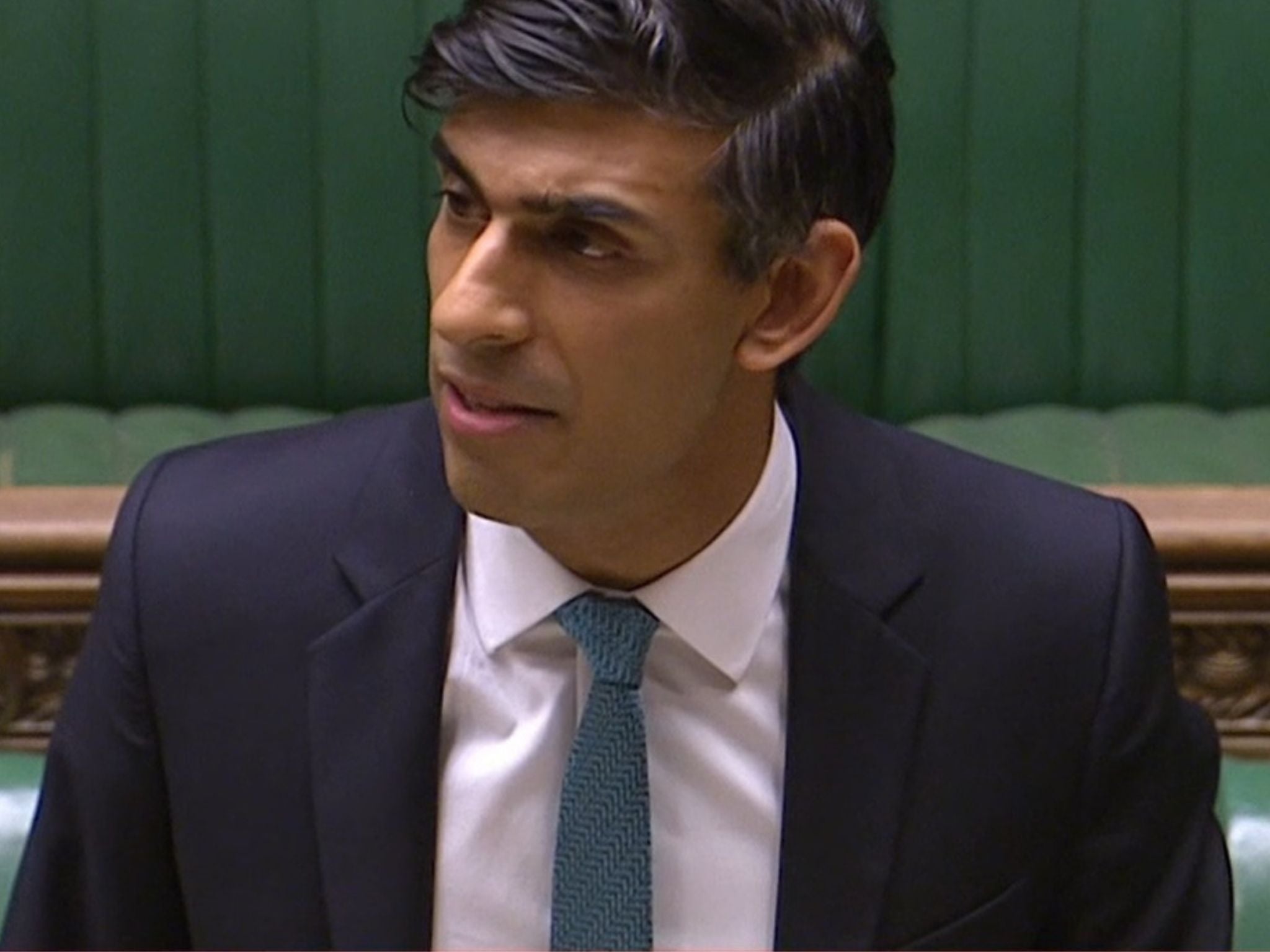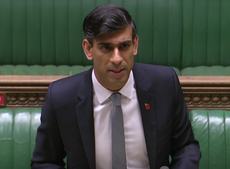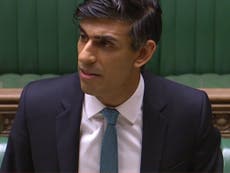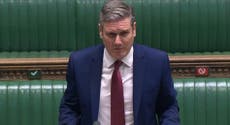Debate over when to introduce tax rises tees up an arm-wrestling match between Rishi Sunak and Boris Johnson
For all the spending, tax rises – and when to introduce them – is the great but largely unspoken divide in the Tory party


Your support helps us to tell the story
From reproductive rights to climate change to Big Tech, The Independent is on the ground when the story is developing. Whether it's investigating the financials of Elon Musk's pro-Trump PAC or producing our latest documentary, 'The A Word', which shines a light on the American women fighting for reproductive rights, we know how important it is to parse out the facts from the messaging.
At such a critical moment in US history, we need reporters on the ground. Your donation allows us to keep sending journalists to speak to both sides of the story.
The Independent is trusted by Americans across the entire political spectrum. And unlike many other quality news outlets, we choose not to lock Americans out of our reporting and analysis with paywalls. We believe quality journalism should be available to everyone, paid for by those who can afford it.
Your support makes all the difference.When Boris Johnson overruled Rishi Sunak by rejecting a rise in the rates of income tax, national insurance and VAT, his reason was that this would breach last December’s Conservative manifesto. On the same grounds, Johnson blocked Sunak’s move to end the triple lock, which ensures the state pension rises in line with inflation, earnings or 2.5 per cent, whichever is highest.
And yet the government has different criteria – and values – when it comes to overseas aid. In his spending review today, the chancellor confirmed he will ignore the manifesto commitment to keep aid spending at 0.7 per cent of gross national income. It will be cut to 0.5 per cent, saving £4bn, until the fiscal position allows it to return to 0.7 per cent.
Sunak justified the controversial cut by painting a bleak landscape with borrowing at £394bn in the current financial year because of coronavirus (it was supposed to be £55bn). The economy will contract by a bigger than expected 11 per cent this year, with unemployment rising to 2.6 million next year.
Why the different standards on aid? One unstated reason is that ministers believe the cut will play well in the red-turned-blue wall of seats in the north and Midlands won by the Tories last December. As one Tory MP told me: “My voters think that charity begins at home when we are facing an unprecedented economic crisis.”
Yet the £4bn saving might cause disproportionate grief. The timing is strange when Johnson wants to make real his vision of a post-Brexit “global Britain”. Cutting aid to the world’s poorest countries during a global pandemic might undermine the impact of a £16.5bn boost to defence spending over four years, which Johnson hopes will allow the UK to play a bigger part on the world stage. It will hardly impress Joe Biden, either. “Cutting the aid budget during a global pandemic is like closing fire stations during a heatwave,” said Patrick Watt, Christian Aid’s director of policy, public affairs and campaigns.
Sunak will also face trouble closer to home. The five living former prime ministers – Theresa May, David Cameron, Gordon Brown, Tony Blair and John Major – have already condemned the move. So have many Tory MPs outside the blue wall, potentially enough to defeat a measure that will require legislation.
The blue wall was also in Sunak’s mind when he pulled out his one rabbit: a £4bn levelling up fund, which will delight the Tory MPs in the north and Midlands. Sunak rather gave the game away by saying the local projects it would fund would have to make a difference by the next election. Bids and approvals will be watched closely to see how much of the £4bn goes to Tory-held seats, already a criticism of existing £240m towns fund.
Sunak sugared the pill of another controversial change – a freeze on public sector pay outside the NHS. It wasn’t as bad as trailed: the 38 per cent of public employees who earn less than the £24,000 median wage will get a rise next year. However, the freeze for other workers will take spending power out of the economy just when the chancellor needs the wheels to turn again.
He promised to close the gap in the public finances in “the medium-term” but was deliberately vague about when that will happen. The Office for Budget Responsibility warned today of a fiscal hole of between £20bn and £30bn to stop debt rising by the end of this five-year parliament. With “austerity fatigue” among the public limiting the scope for spending cuts, that will inevitably mean painful tax rises, but Sunak gave few clues about that today.
We will have to wait for future Budgets for an answer to the crucial “when?” question. The danger for the Tories is that the economic and political cycles are out of synch. Normally, tax rises are implemented soon after a general election in the hope they are forgotten by the next one. Sunak’s instincts as a fiscal conservative, and the Treasury’s view, will be to raise taxes before the election due in 2024.
But the politics will point to delaying them until after the election. Philip Hammond, the former chancellor, told a Resolution Foundation webinar before the spending review that anyone who thinks fiscal consolidation will begin in 2023 “is living in fairyland”. He said: “I see very little appetite for dealing in hard truths as there’s going to be a general election in 2024.”
This debate potentially tees up an arm-wrestling match between Sunak and Johnson, who will instinctively sympathise with the band of Tory MPs who favour tax cuts to spur growth. It is the great but largely unspoken divide in the Tory party.
Another possible cause of tension between 10 and 11 Downing Street will be Sunak’s ambitions. Although he denies he wants the top job, his surprisingly wide-ranging speech suggested otherwise. He set out his personal credo, saying: "The spending announced today is secondary to the courage, wisdom, kindness and creativity it unleashes. These are the incalculable but essential parts of our future, and they cannot be mandated or distributed by government.”
Message to Tory MPs and grassroots members (who elect the party leader): my vision is less “big state” than Johnson’s.




Join our commenting forum
Join thought-provoking conversations, follow other Independent readers and see their replies
Comments